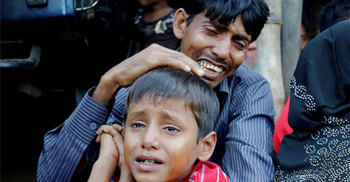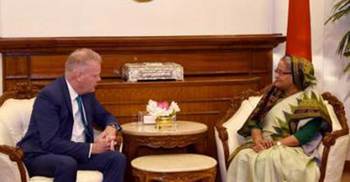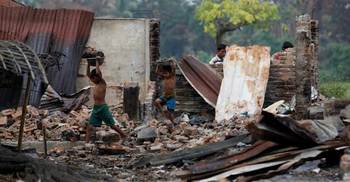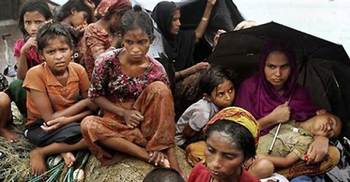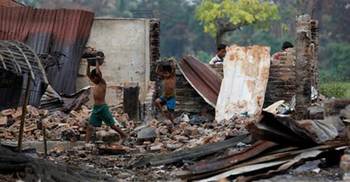Burmese military killed seven of my children: Rohingya refugee
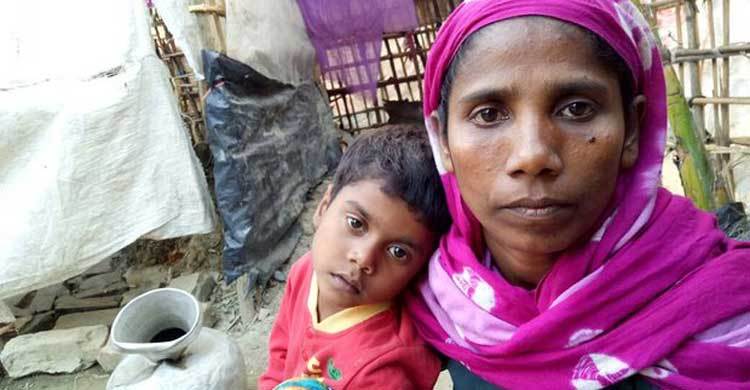
Noor Ayesha held her last surviving daughter tight as their boat crossed into Bangladeshi waters. She left behind a firebombed home, a dead husband, seven slain children and the soldiers who raped her.
“A group of about 20 of them appeared in front of my house,” the 40-year-old Rohingya woman recalled of the morning in mid-October when her village was invaded by hundreds of Burmese government troops. “They ordered all of us to come out in the courtyard. They separated five of our children and forced them into one of our rooms and put on the latch from outside. Then they fired a ‘gun-bomb’ on that room and set it on fire.
“Five of my children were burnt to death by the soldiers. They killed my two daughters after raping them. They also killed my husband and raped me.”
She said just one child survived the frenzy: five-year-old Dilnawaz Begum, who hid in a neighbour’s house when the soldiers arrived in the village of Kyet Yoe Pyin, in the Maungdaw township of Rakhine state.
Ayesha’s account is one of a wave of reports of extrajudicial killing, arson and sexual assaults allegedly committed by Burmese soldiers in the north-west of the country. The government strongly denies the allegations, but the UN says the reports of rape and sexual assault are “part of a wider pattern of ethnically motivated violence” against Rohingya communities in Rakhine.
The alleged raid on Kyet Yoe Pyin, also known as Kyariprang, was part of renewed military clashes in the state that followed an assault on Burmese border guards on 9 October. Nine policemen were killed in the attack, which Myanmar’s government has blamed on Rohingya insurgents.
Security forces have responded with what they claim are counter-insurgency operations, which have driven up to 15,000 Rohingya refugees across the border into Bangladesh in the past months.
Most are squatting in makeshift refugee settlements in the Bangladeshi coastal district of Cox’s Bazar, where the Guardian interviewed three women, including Ayesha, who had recently fled Kyet Yoe Pyin and recounted the human rights abuses they say were perpetrated there and in surrounding villages in the days after 9 October.
Sayeda Khatun was more than five months pregnant, but said that did not deter the soldiers who arrived at her house in the village around noon on 11 October. “They carried me at gunpoint to a large courtyard in the village where they had gathered around 30 other Rohingya women,” the 32-year-old said.
“From among us the soldiers separated around 15 younger ‘good-looking’ women and took them away to an unknown place. I was in the group of about 15 older women who were raped in that courtyard by the soldiers. Fearing that they would shoot and kill us, all of us took off our clothing as the soldiers ordered.”
She considers herself lucky: she lost no family members and eventually found a way to escape to Cox’s Bazar with her husband, Oli Mohammad. But the violence has fractured their relationship, Mohammad believing the men who raped Khatun are also her baby’s fathers, “at least partly”.
“My husband said the baby is impure and should be aborted,” she said. “I resisted the idea of the abortion from the beginning. In Bangladesh some people counselled my husband that only he is the real father of my baby. But he is firm on his belief that the baby has been fathered by many, including him … and he has distanced himself from me.”
Noor Hossain, a resident of a neighbouring village, Ngasaku, told the Guardian by phone that the Burmese soldiers had arrived in Kyet Yoe Pyin on 11 October accompanied by Buddhist settlers known as Natala.
More than half the Rohingya community’s 850 houses were razed over the next two days and soldiers killed at least 265 people, he claims.
“At least 100 women were raped and 25 of them were killed during the attack in Karyiprang. At least 40 Rohingyas were burnt alive in the village. Apart from killing people with gunshots and burning them, the soldiers also slaughtered many with knife. They also took away about 150 Rohingya men who have not returned as yet,” Hossain said.
The former UN secretary-general Kofi Annan was recently permitted to visit the state and interviewed villagers in Kyet Yoe Pyin on 3 December. He told a press conference in Yangon on Tuesday that his committee was “deeply concerned by reports of alleged human rights abuses” in Rakhine and urged Burmese security forces to act within the law.
A UK-based Rohingya community leader, Nurul Islam, said at least two Rohingya men who had spoken to Annan were later arrested by security forces.
He claimed Burmese soldiers resumed operations in north Rakhine Rohingya villages two days after Annan’s visit, and that at least 50 women were raped and four killed this week in the village of Kyauk Chaung.
Myanmar, a majority Buddhist nation, has long been accused of persecuting Muslim Rohingya communities, who have deep roots in the country but are denied citizenship and government services and considered illegal immigrants from Bangladesh.
About one million Rohingya are thought to live in Rakhine state. An outbreak of communal violence in 2012 led to more than 100,000 of them seeking refuge elsewhere or settling in highly restrictive displacement camps.
Aung San Suu Kyi, who became de facto leader of Myanmar in March after two decades of military rule, has said her government will address the reports of violence committed in the north-west.
But the Nobel laureate, whose control of the country’s military is uncertain, has also accused the media and human rights groups of “concentrating on the negative side of the situation”.
Aung Win, the Burmese official tasked with investigating the 9 October attacks on the border guards, has denied reports of atrocities and argued that “all Bengali [Rohingya] villages are military strongholds”. He also claimed Burmese soldiers would not have raped Rohingya women because they “are very dirty”.
Rakhine has been largely shut to journalists and human rights monitors in the past weeks and none of the accounts given to the Guardian can be independently verified. But the UN estimates about 30,000 Rohingya Muslims have fled their homes in recent months, and satellite images produced by Human Rights Watch show 1,250 structures have been razed in a similar period in Rohingya villages, including 245 in Kyet Yoe Pyin.
The Bangladesh navy has been accused of turning back boatloads of Rohingya refugees trying to flee Myanmar, though thousands more continue to make journey each week.
At a rally in Kuala Lumpur at the weekend, Malaysia’s prime minister, Najib Razak, likened the persecution of Rohingyas in Myanmar to a genocide.
Penny Green, a professor of law at the University of London, led a 12-month investigation into the Burmese military’s campaign against the Rohingya and concluded that the military was “engaged in a genocidal process” against the minority group.
“It’s important to understand genocide as a process which may evolve over many years, beginning with the stigmatisation of the target community and moving into physical violence, forced isolation, systematic weakening and finally mass annihilation,” she said.
“For four years now the Rohingya have suffered state-sponsored denial of access to healthcare, livelihood, food and civic life as well as debilitating restrictions on their freedom of movement.
“And now, since 9 October this year, the Rohingya in northern Rakhine state are facing a terrifying new phase in the genocide: mass killings, rapes, village clearings and the razing of whole communities, committed with impunity by the Myanmar military and security forces,” she said.
Source: The Guardian

